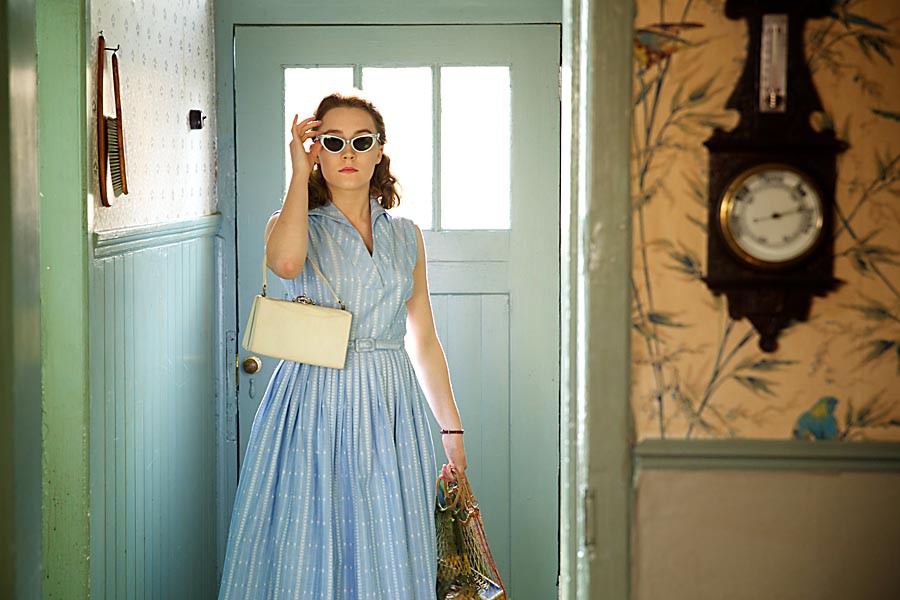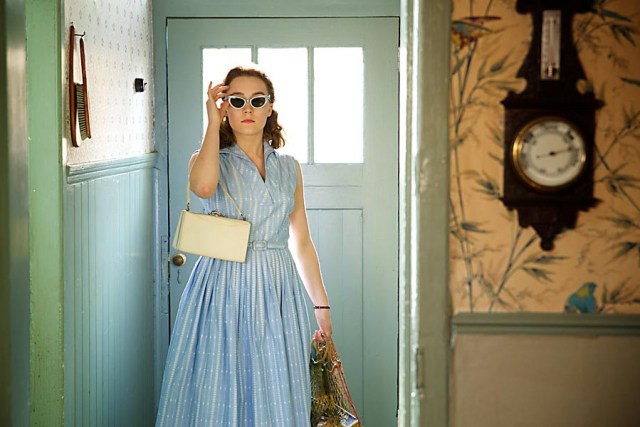Writers-in-Contention: Brooklyn’s Nick Hornby on Using His Feminism in Screenwriting & More

To kick starting the Hollywood awards season, we will be speaking with writers from some of the most acclaimed films of the year every Monday to discuss their writing process.
UK writer Nick Hornby began his career writing about his obsessions (primarily “football” and his love of music), often focusing on his male protagonists’ resistance to “moving on.” His best known novels, About a Boy and High Fidelity, focus on men stuck in some very sad states of arrested development. He also wrote the very funny memoir and film Fever Pitch (not the Farrelly Brothers’ remake), about his love (unhealthy obsession) for the Arsenal Football Club, starring Colin Firth and Mark Strong. But he’s found a second career as a highly praised screenwriter, adapting books focusing on complex, young female protagonists: 2009’s An Education (which earned him an Oscar nomination), 2014’s Wild, and this year’s Brooklyn. He spoke with us about his new film (in select theaters next week) including connecting to his female protagonists, the difference between adaption and original works, and using the dramatic benefits of writing for a female protagonist.
Lesley Coffin (TMS): When I saw the film, I loved it, cried a couple of times, but truly loved it. When you read the book, what made you want to adapt it to the screen?
Nick Hornby: I think I was mostly drawn to the beautiful balancing act of the third act, when she goes back to Ireland. When I was reading the novel, I thought, there is no way they would be able to persuade me that she should stay there. And then Colm does it. And he manages to maintain these two worlds in her head, and make it this agonizing choice. And I felt it would work really well dramatically in film. And I could see the potential to amp up the emotions in the book just a bit and make an old-fashioned weepy. Which we don’t often see much anymore. And I loved the character, I loved the central character’s watchfulness. So there were loads of gifts for me in the novel.
TMS: Are you someone who likes to watch a weepies? Movies which will make you cry and give you that catharsis while watching?
Hornby: I do like those films. When you can feel that sensation, welling up from somewhere very deep inside yourself, then yes. I don’t think we have enough of those at the movies, or when we read books. Something which speaks directly to you and without artifice is such a rare thing, so it should be prized when we come across it.
TMS: Being a novelist yourself, are you conscious of how much freedom you can allow yourself when adapting someone else’s work?
Hornby: I think the answer is, I don’t have to think about it, because if I’ve bonded with the book initially, then I’ve already connected to the book and the author’s words. One of the fantastic things about adaptation is, I get to work on a project which isn’t originating with me. It isn’t a product from my own head, but is something I had an emotional response to. So I feel like I can escape from myself for a little while. And a work like this gives me the chance to use my skills as a feminist to think about and speak about things I normally wouldn’t. And certainly with An Education, Wild, and now Brooklyn, I did the adaptions because I loved the books and they spoke to me. And what speaks to me, isn’t necessarily the same thing I’ll write all on my own.
TMS: Wild, An Education, and Brooklyn are all novels with protagonists with very strong voices, often very complicated internal lives, and are excellent examples of modern feminist literature, Brooklyn and An Education being historical novels, Wild being a memoir. Hearing you talk about yourself as a feminist, do you feel you bring that perspective to the work?
Hornby: Regarding my own feminist views, I’m very sympathetic to it and believe deeply in it. But the more relevant thing is that those struggles provide rich drama, and that is what you’re looking for all the time as a writer. You need a character that will overcome something, and feminist stories by definition always have that drama. So I think I responded dramatically as well as politically to their stories.
TMS: Did you feel a personal connection to Eilis’s character and her struggle between her family roots and starting a new life?
Hornby: It’s not something I’ve necessarily experienced. But I think it was so beautifully conveyed in the book, that I had the desire to try an express it cinematically. I felt those things reading it, as anyone would, but I don’t think I had any personal identification with her specific struggles, beyond the strong feelings I had reading it.
TMS: We often hear about the struggle some writers have writing realistic characters who are unlike themselves. But it sounds like you don’t struggle with that issue as a screenwriter.
Hornby: That is probably the biggest difference for me between writing my own books and films, and adaption. I think I do need to understand them and sympathize with them on a more personal level. Simply because I don’t want to spend all those years with them, writing and rewriting, talking about and thinking about characters I have no personal connection to. But I think there is something slightly different between identifying with a character and liking or loving a character. I love the women in these stories, I want the best for them, and I want to make sure people understand the predicaments they find themselves in.
TMS: Were there scenes in the book you were concern about getting right?
Hornby: Well, the book is very slender, so I didn’t have to cut much of the narrative down. And it was evident to me right away what the key scenes of the book which would be. The most pivotal scene of the book, and most difficult scene to get right in the adaption, was towards the end when Mrs. Kelly, who runs the shop, calls Eilis in and tells her “I’ve discovered your secret.” And we wanted that scene in the movie, but changed the emphasis of if slightly. In the book, she kind of goes to America because she has to go to America, and we wanted Eilis to assert herself at that point, and make it clear that she’s going back to America precisely because of people like Mrs. Kelly and their mindset. It was a scene we knew had to be in the film, but we also knew would have to have a slightly different nuance, if it would work as a movie. Colm was much more ambivalent with that scene in the book, but that wouldn’t have helped us make the kind of movie we wanted to make.
TMS: Since becoming a screenwriter who adapts other’s works, has it changed the way you write your own novels and short stories?
Hornby: I don’t think so. I’ve only managed to write one novel since I’ve begun adapting other people’s books. And I think the only think affected is the way I felt writing it, because there was nothing to stop it from coming out. When you write a film, there are about a million things which can stop it from getting made. And, when I write a book, I don’t have to consider things like budgets. So I’ve probably became more aware of the freedom I have writing novels, when I finally got around to doing it. There was a sense of liberation I enjoyed, that I never fully appreciated before embarking on this second career.
TMS: Have you considered writing original screenplays?
Hornby: I have been writing an original, which might get made in a year. But I’ve discovered that one of the really interesting things about the movie business is, there is more of a sense of urgency with adaptations than with original screenplays. When someone is coming to me to adapt a book, they’ve already paid for that book, and that means they are on a clock. They usually have it for 18 months and an option for another 18 months, so we have to get going, because the clock is ticking. Original screenplays, including the one I’m writing, are written on spec. So adaption takes priority because, not that I’m interested in the money, but I literally owe people money in the sense that they’ve paid me to write and I owe them a script. So originals get further pushed down on the work pile, and it becomes more of a hobby than a job. So my original has been on a slow track for about 3 or 4 years.
TMS: I know that with Wild you knew as soon as you signed on that Reese Witherspoon would have the leading role. Did you have any idea who would have the leading roles in Brooklyn?
Hornby: Not a single one. In fact, when I wrote the first draft of Brooklyn, in about 2010, Saoirse Ronan would have been far too young to play the role of Eilis. So it was our luck that it took us so long to have made the movie because she got old enough to star in it. But with Wild, it really helped to know Reese would be playing Cheryl Strayed, knowing what she could do and also having an idea of just her physical shape. Reese is quite small, and there is that scene with the backpack at the beginning, which I knew would absolutely work. The backpack is almost her size, and I had that visual in my mind when I was writing it.
So I knew the comedic possibilities and also the physical hardships she would have, and that was very useful in writing Wild. In contrast, with Brooklyn and An Education, the central protagonist is so young, there was no way of knowing who the actress could be by the time we went into production. I wasn’t writing for established stars because the characters are supposed to be two nice, ordinary young girls, so you have to rely on casting directors to find someone incredible, as they did with Saoirse and Carey Mulligan. I just experienced that with a TV series I did in the UK, Love Nina, and that also called for the casting of a young woman in her early 20s, so I didn’t know who I was writing for at the time, but we found Faye Marsay, who is wonderful in the role. If the role called for a 30-something, I probably would have had some established stars come to mind, but with these specific screenplays, I had no idea who would be playing the protagonists while writing.
(image via Fox Searchlight)
Lesley Coffin is a New York transplant from the midwest. She is the New York-based writer/podcast editor for Filmoria and film contributor at The Interrobang. When not doing that, she’s writing books on classic Hollywood, including Lew Ayres: Hollywood’s Conscientious Objector and her new book Hitchcock’s Stars: Alfred Hitchcock and the Hollywood Studio System.
—Please make note of The Mary Sue’s general comment policy.—
Do you follow The Mary Sue on Twitter, Facebook, Tumblr, Pinterest, & Google +?
Have a tip we should know? [email protected]
